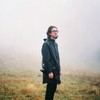Photo from 'Voices Over The Horizon.'
Advertisement
Evan Roth: So this workshop is essentially going to get people to make micro-computers that control radio frequencies. It's using old-school ghost-hunting techniques that are basically like jamming the scan button on a radio. The belief among paranormal communities is that because ghosts are this disembodied energy without a physical form to communicate with, they're able to control electronic devices in a way to stitch together syllables and communicate to us.In your London show, Voices Over The Horizon, you used the same tools to get audiences thinking about how misusing technologies can produce positive results. Why did you choose to do this?
A lot of my work is about trying to understand what this flood of data is doing to us, and how we're culturally interacting with online networks.I don't believe in ghosts. I do believe that misusing these technologies can lead to interesting art. Doing this places us in interesting scenarios that come from the unexpected.
Advertisement
Eyewriter glasses allow paralyzed people to draw graffiti with their eyes.
Look at The Pirate Bay, for example. It's probably my favorite act of cultural productivity in my lifetime. They probably wouldn't call it art, but whatever that was, it was great. In the lead up to my London show, Peter Sunde from The Pirate Bay gave this talk at Berlin's Transmediale, and outlined a lot of the things I was feeling and wrestling with at the time. He says we've lost the battle for a freer internet.This could've been a depressing moment, but when I heard him say that, it felt good because somebody put the words to something I couldn't. Maybe a lot of people had too much faith in the internet being something more than another means of mass control … and there's something empowering in admitting a loss of control, because you can start to do other things.Yeah, the internet certainly isn't as utopian as we all believed it was, so where does the conversation move now?
We need to be conscious of our dependency on online convenience. We all know our data is monetized and is being tracked, but we're passively accepting this with each less click. So this "freedom vs. convenience" argument is probably one of the most defining discussions of our time. If we can figure out a way to make it OK to step backwards technologically, and trade back some of that freedom for some of our privacy, maybe that could be a step-forward. But I don't know how to do that yet.
Advertisement
That's one of the reasons FAT's ending soon, because things just don't feel funny anymore on the internet. Back in the mid to late 2000s, we were trying to make fun content that made people click on it, even if they disagreed with our message. Getting a click for the sake of it doesn't make sense anymore, because the idea of the viral "cat video" is so transparent—all I see now are cookies and integrated marketing.So as an artist, how do you avoid falling into the clichés of making "viral content"?
You want your work to continually give people new ways to see it, much like watching a good film again and again. If you can make a piece that works across multiple platforms, where someone can engage with for three seconds online or sit in a gallery with it for ten minutes, then the artwork is fundamentally better. Some of that's lost in the art that's being geared too much for the internet.Like how some works are increasingly designed for platforms like Instagram and nothing else?
Instagram has become a pretty big platform for art. People get made on it now. Or at least, if they're not getting made, their work gets circulated. People are overly-designing their art to fit that platform. When people come and invest time with your work, I think it's good for the art to reward that.Evan Roth will be appearing at Semi Permanent Auckland from July 3 to 4. You'll also be able to check out his ghost-hunting gear on July 6.Haven't got your ticket yet? Tweet us at @vice_nz to go into the draw to win a double pass.Follow Alan on Twitter.
